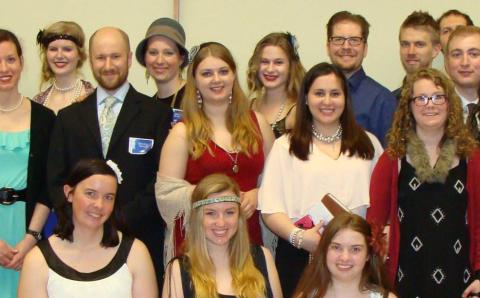“I don’t see why we need to get married if we’re committed to each other. Marriage is just a piece of paper.”
“Marriage is a right that shouldn’t be denied to any couple, whether homosexual or heterosexual.”
You’ve almost certainly heard these sentiments today. Whether in Canada (where same sex marriage has been legal nationwide for nearly 10 years) or in the United States (where the Supreme Court legalized same sex marriage earlier this year), marriage is increasingly viewed as a civil right that should be extended to all couples, regardless of sexual orientation. At the same time, the number of couples living together without seeking the traditional marriage commitment continues to rise on both sides of the border. The church seems caught in the middle.
So should the church adapt her positions and her interpretation of Scripture in order to be more accepting? Dig in her heels and fight the cultural trends that threaten the church’s historical position? There is no shortage of voices on either side of this issue.
Sadly, our conversations can sound more like we are playground bullies than followers of Jesus. Those on both sides of the issue spend more energy stating what they oppose rather than what they are for. What remains to be heard is a positive argument for the historic view of marriage. Here are two reasons why the traditional biblical view of marriage portrays something of great value—not only to married people but to society at large.
Marriage Is a Covenant That Reflects God’s Character
Marriage was not created merely as a romantic relationship, nor even as an institution aimed at self-fulfillment. Marriage is God’s way of modeling his covenant-keeping nature. In Ephesians 5:32, Paul concludes his instructions on marriage by stating, “This is a great mystery—but I am talking about Christ and the church.” Paul has been giving instruction on marriage, when suddenly he is describing Christ’s relationship with his church. Is Paul talking about marriage or the church? The answer is yes; marriage is patterned after God’s relationship to his church. Thus, in marriage (our own or others’) we begin to know God more intimately.
How? In a godly marriage we begin to discover what it means to be deeply known and steadfastly loved. From beginning to end, God’s preferred way of relating to his people is by covenant. By making a covenant, God joins himself to his people, pledging to remain steadfastly committed and loving his imperfect people even at the cost of death. In other words, by making a covenant, God makes an unwavering promise that he will continue to love and care for his people—even though they may fail God, even though they may be unfaithful to him, and even though they may grow cold in their love for him. In the fullness of time, God kept this promise with his people, even though it meant laying down his life for them in death. As a covenant, marriage is, ideally, meant to model this steadfast, promise-made/promise-kept relationship. In a marriage, two people publicly bind themselves together, committing themselves to one another, promising to be faithful, exclusive, and sacrificially loving, until death.
Keeping this commitment is no small effort. Feelings and affections can cool for a season. Circumstances like illness, job loss, or family conflict can create strain that tears at the fabric of a marriage. And of course, we stare at our own personal sins and failures—pride, a critical spirit, and selfishness, to name a few—in the mirror of relationship. The covenant of marriage is meant to hold husband and wife together through these purifying fires, leading us to growth and maturity.
Seasoned spouses will often acknowledge times in marriage when it was the covenant vows alone that kept them together. But when the vows are kept and the covenant upheld, those around begin to glimpse (though admittedly through a dark glass) what God’s commitment to us actually looks like: a promise made to us, and a promise kept, even at infinite cost to himself. Faithfulness to his bride, through sickness and health, good times and bad. Marriage, then, becomes a beautiful portrayal of the gospel itself.
So why withhold this covenant from same sex couples? This is a fair question that requires a careful and pastoral response. In part, the answer lies in how marriage reflects not only God’s relationship to the church, but also his nature. Genesis 1:27 emphasizes that when God created human beings, he “created them in his own image, in the image of God he created them; male and female he created them.”
Masculinity and femininity are not artificial social constructs, nor are they traits to be either idolized or ignored. They are a piece of what it means to reflect God’s image. In a marriage between man and woman, the image of God is reflected in a way that is unique. This does not diminish single people, who also beautifully reflect the image of God. Rather, it suggests that when two people become one flesh, God’s intent is to illustrate something of his image that cannot be communicated in homosexual relationships. The joining together of male and female as one gives us a more complete picture of God’s character.
So how ought the church live in the midst of these changing times? First of all, churches ought to do all they can to promote healthy marriages that reflect God’s covenantal relationship. This means preaching and teaching about marriage, it means promoting premarital ministry, as well as ministry to married couples. Some churches have invited couples who have been married for a decade or longer to serve as mentors to newlywed couples. Church leaders would be unwise to take an indifferent approach to couples living together. Each situation is unique, of course, so there are no one-size-fits-all answers. But churches should take care to disciple couples to pursue the covenant commitment of marriage, even though that may be culturally unpopular. Such care for those living together should always be offered with the truth and grace that Jesus himself so marvelously demonstrated.
The Church Must Call People to Holy Living
That brings us to the second reason why the church must become known for upholding the traditional biblical view of marriage, particularly as it relates to those experiencing same-sex attraction. As a church, we must learn to love deeply those with whom we disagree. Jesus showed on many occasions the transformative ability to love a person while simultaneously calling them out of sin and into holiness. Too often we are known for one or the other: we call people to holiness, but we do it without love. Or we love people unconditionally, but we dismiss the destructive presence of sin. Neither fits the fullness of the biblical approach. The church must be a place that embraces those struggling with sexual sin—loving them, encouraging them, and joining them in pursuing the gift of holiness.
A couple I once counseled listened intently as I shared this biblical pattern for sex and marriage. In their past, all they had learned from the church were the cold and unfeeling rules about sex and marriage. Those who kept the rules were accepted; those who did not were judged. Hearing this message on marriage, they said this was a message they had wanted to hear their whole lives.
As a church, we have a glorious message to bring to the world! Let us be faithful to speak it and live it well, before the eyes of a watching world.
Related:
About the Author
Rev. Rob Toornstra is pastor of Sunnyslope CRC, Salem, Oregon.









